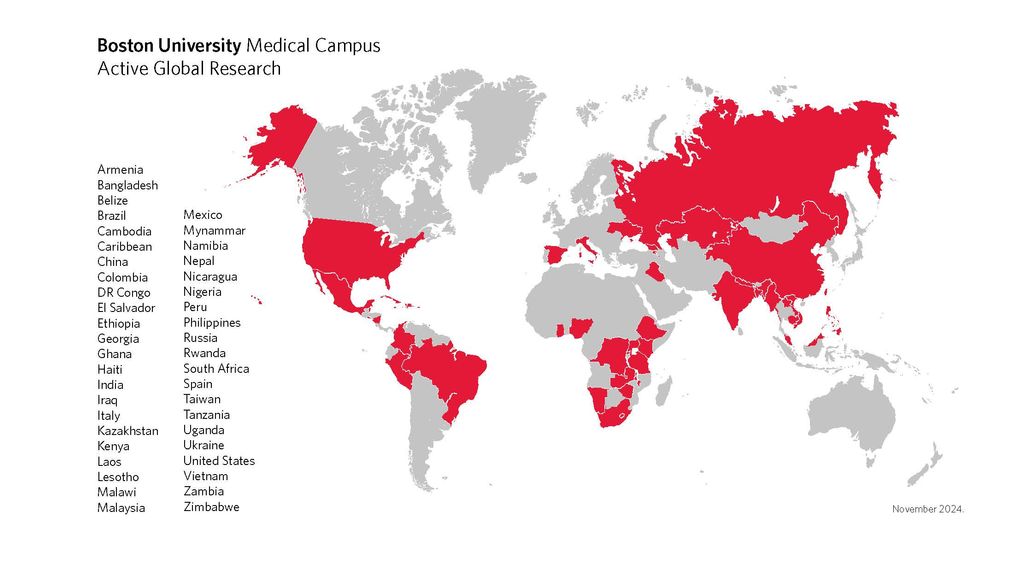Provost Workshop on Global Health Initiatives Aims to Foster Collaboration
The Provost Workshop on Global Health Initiatives, held in Hiebert Lounge Oct. 28, drew approximately 50 faculty, researchers and staff from across the Medical and Charles River campuses. Medical Campus Provost and Dean of the Chobanian & Avedisian School of Medicine Karen Antman, MD, characterized the workshop as the initial step in a process she hoped would result in greater collaboration and coordination of the University’s resources and personnel to address global health.
One of the workshop goals, according to Antman, is to produce a report and a map that catalogues, by country and area of research, where global health initiatives by faculty, researchers and students are underway. Eighty-four people expressed interest in the workshop and the report will be circulated to those who couldn’t attend with the hope they will add their information to the database.

MapGlobal Health Master 12/2024
“It’s a spectacular turnout. I have a much better sense of where we are now,” Antman told those in attendance. She envisioned more seminars and workshops with speakers from across the University to stimulate further collaboration and keep the project list up to date.
“We’d like to reimagine our global health initiatives. What can we be doing to help you? What kind of support do you need?” Antman asked the audience.
“This is a great thing,” said Patricia Hibberd, MD, PhD, chair of global health at the School of Public Health and professor of medicine in infectious diseases. Hibberd was surprised at both the variety of research areas and the number of people involved.
“I think we’re never going to find answers to public health problems by studying things in just one place or country,” Hibberd said. She said collaboration across countries and disciplines would make the global health research and work stronger and more impactful.
Stephen Christiansen, MD, professor and chair of ophthalmology and professor of pediatrics, said personnel from his department are working in Lesotho, a mountainous country in southern Africa, providing eye care and training for local nurses, ophthalmologists and optometrists in conjunction with BU’s long-term commitment to that country.
Christiansen saw two huge benefits to the workshop.
“Number one, that people who don’t know one another across a big campus like this one, with so many faculty, find people of similar interests; and number two, the potential collaboration that results from people sitting across the table or across the room from one another,” said Christiansen. “That could create new efficiencies and ways to find new solutions to problems that wouldn’t otherwise happen.”
“Sometimes you don’t even know what other people are working on and you can really get into silos,” said Muskaan Khemani, a research data analyst at the Center for Climate and Health at the School of Public Health. Khemani recently worked with the international multidisciplinary consortium CHAIR-India on climate, health and air pollution research in India and she attended the workshop to share her center’s work.
Joseph Leanza, MD, MPH, assistant professor of emergency medicine and director of global health programs for medical students, has worked on humanitarian response, education and development in Iraq, Ukraine and along the southern U.S. border.
“I was excited to meet other faculty who work internationally and, through that, find opportunities for our medical school students and residents to work with faculty in global health,” Leanza said. COVID-19 curtailed travel and the numbers of students working overseas is just now recovering from those restrictions, he said with 15 to 20 medical students each year working abroad, compared with 40 pre-pandemic.
“Now that we will have this report, students who want to go to Colombia will know who has research in that country, whom to contact,” said Antman. The report also might connect them to funding sources, she added.
But why devote time and resources to global health initiatives?
“There is a common saying in global work that “Local is global,” said Lawrence Were, PhD, assistant professor of health sciences at Sargent College of Health & Rehabilitation Sciences.
Were has research projects focused on the health economics in Kenya, Ghana, and Nepal and is. He said globalization and immigration bring the world’s health problems into U.S. hospitals.
“At some of the clinics (at Boston Medical Center) you will find people from all over the world,” he said. “They are local to Boston, but they represent global interactions.”
Global health initiatives benefit the University and the Medical Campus in less obvious ways.
“We do it for the mission (of helping populations get access to healthcare),” said Antman. “International work and research also boost the school’s scope and collaborations, and the University’s involvement in global health initiatives attracts outstanding faculty and students.
“People want to be working on projects that are bigger than themselves. Students want to go out on these rotations and faculty want to do the research,” she said.